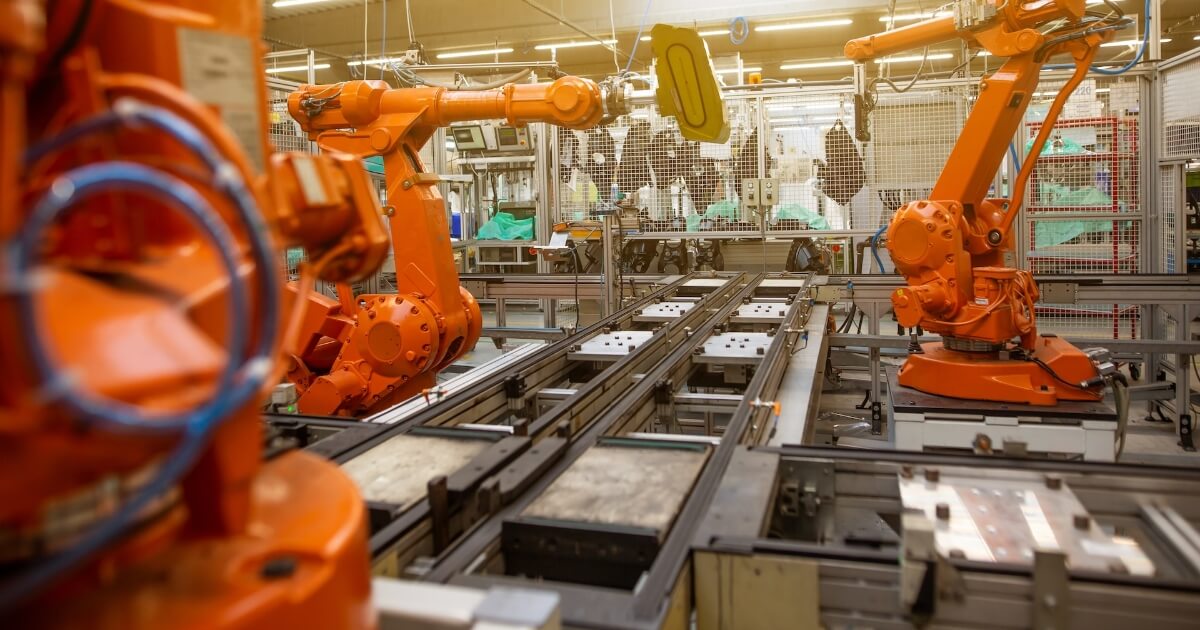Retailers and brands have increasingly been turning towards contract manufacturing as a means of expanding product lines. Outsourcing manufacturing has been a growing trend over the past 30 years, going from $2.0 trillion in 2018 to $2.7 trillion in 2023. It makes a lot of financial and business sense, as it’s a cost-effective way to easily expand manufacturing capabilities without having to spend on building up the expensive infrastructure to manufacture in-house, such as investments in specialized machinery, warehouse space, and training labor, to name a few.
In this blog, we will explore the concept of contract manufacturing, including its definition, types, and examples of product categories that utilize this manufacturing method. We will also examine the pros and cons of outsourcing to a contract manufacturer, breaking down the advantages and risks to help you decide whether it is right for your business. Let’s get started.
What is Contract Manufacturing? Understanding the Basics and Beyond
Contract manufacturing is a business practice that allows businesses and entrepreneurs to bring their product ideas to life with the help of specialized manufacturing firms. With the rise of private label brands from retailers like Amazon, Target, Kroger, Home Depot, and other large brands, contract manufacturers have become an essential part of the supply chain.
So, what exactly is it? Contract manufacturing is a business relationship where a company hires another firm to manufacture and produce goods on its behalf. This outsourcing business arrangement allows the company to focus on other aspects of its business, such as distributing, marketing, and selling. At the same time, the manufacturer produces goods by taking care of the production process.
The company typically provides the manufacturer with a detailed product design, specifications, and the necessary components. The manufacturer then uses its expertise and resources to manufacture the product, following the specifications provided by the company.
The manufacturer often manages the entire manufacturing process, including sourcing raw materials, production planning, assembly, quality management system, and supply chain management of the finished products. The company may not be involved in the day-to-day operations of the manufacturing process; however, it receives regular updates and progress reports from the manufacturer.
Key Considerations For Choosing A Contract Manufacturer
When choosing a contract manufacturer’s business, it is important to consider several factors to ensure they can deliver high-quality products efficiently. In addition, the following aspects should also be considered, apart from product expertise and resources:
- Reputation: A reputable provider with a proven track record of delivering high-quality products on time and meeting customer expectations is a key element in an ideal manufacturer.
- Financial stability: Working with a financially stable manufacturer is important to ensure they can continue producing the required products in the long term.
- Facility cleanliness and management: A clean, well-managed facility is essential for producing high-quality products and ensuring the safety of workers.
- Quality control: Look for an ISO-certified (International Organization for Standardization) provider indicating that they have implemented internationally recognized manufacturing quality standards.
- Dropshipping capabilities: If required, a provider should be able to send the products directly to customers through dropshipping.
Companies commonly use contract manufacturing services to reduce costs, increase production efficiency, and expand their product lines without investing in new facilities and equipment. It also allows them to access the specialized expertise and resources of the third-party manufacturer, which can help improve their products’ quality and consistency.
Breaking Down the Different Types of Contract Manufacturing: Which Is Right for You?
A company can choose a manufacturing type based on its needs and requirements. Some of the most common types of them are below:
1. Private Label Manufacturing:
Private label manufacturing is a provider that produces a product for another company. The company selling the product will use its brand name, which is why this type of manufacturing is commonly known as a “private label.”
With this type, the business can create a unique brand identity and product line without investing in the tools required to produce the product in-house. The manufacturer is responsible for producing the product to the specifications provided by the hiring business. The hiring business is responsible for distribution, branding, sales, and marketing.
Private-label manufacturing is an attractive option for businesses that want to expand their product line without incurring additional costs or resources.
2. End-To-End Manufacturing
End-to-end manufacturing is a form of outsourcing production involving the entire production process, from product design to the finished product. The key benefit of end-to-end manufacturing is that it provides complete control over the entire production process.
With this type of manufacturing, the manufacturer and the company work together to ensure that the final product meets its specifications and quality standards.
End-to-end manufacturing helps businesses optimize their production process and reduce the time and resources required to bring a product to market. The manufacturer assumes responsibility for the various stages of the production process, including managing suppliers, sourcing raw materials, manufacturing, assembly, and quality control, allowing the hiring company to focus on marketing and distributing the finished product.
3. Labor or Service Subcontracting
Businesses may choose contract manufacturing, where the contract manufacturer produces a specific part of a larger production process and typically functions as a subcontractor to a general contractor. The general contractor hires the subcontractor to provide specialized services to complete a complex product. This approach allows the general contractor to focus on their core competencies while delegating specialized tasks to the subcontractor.
This approach helps businesses to take on complex projects that need a high level of expertise without incurring the costs of hiring additional employees or investing in specialized equipment.
4. Individual Component Manufacturing
Individual component manufacturing is where the contract manufacturer is liable for producing a specific component that will be integrated into a larger, more complex final product. This arrangement enables businesses to delegate the production of individual components to specialized producers while maintaining control over the final product assembly.
Manufacturers in this arrangement are solely responsible for producing the designated component, which has been designed during the product development process.
By outsourcing the manufacturing of certain components to specialized providers, companies with in-house manufacturing capabilities can streamline their production process and concentrate on other crucial aspects of the final product assembly. This approach is particularly useful when a company needs more expertise or resources to manufacture specific components.
This business relationship provides greater flexibility in supply management, as multiple contract providers can be used to source components, ensuring the best quality and cost-effectiveness.
Which Products and Categories Benefit from Contract Manufacturers? An Exploration of Contract Manufacturing Across Various Sectors.
Here are some examples of contract manufacturing across various product types:
Food & Beverage Products
Using a contract manufacturer to produce packaged food & beverage products for businesses under the company’s brand name is common in the food manufacturing industry. The third-party provider takes care of the entire production process, including sourcing the raw materials, packaging, and labeling of the products.
For example, companies like Kraft and General Mills are leading food manufacturers in the United States who are using contract manufacturing.

Pharmaceutical Products
The pharmaceutical industry is another example. The providers produce drugs, medical devices, and dietary supplements for businesses under their brand name. The provider takes care of the production process, including sourcing the raw materials, formulation, packaging, and labeling of the products.
Some leading pharmaceutical companies that use contract manufacturing include Pfizer, Merck, and Novartis.

Supplements Products
The supplement industry relies heavily on contract manufacturing to meet the growing demand for various health and fitness supplements. Contract manufacturers provide specialized production capabilities for vitamins, bodybuilding supplements, sports nutrition products, and pet supplements.
Nature Made, Optimum Nutrition and PowerBar are some examples that utilize supplement contract manufacturing.

Electronic Products
The electronics manufacturing industry is another industry where contract manufacturing is widely used. The providers produce computer components, such as PCBs, motherboards, hard drives, display screens, and computer peripherals, like keyboards and mice.
Leading electronic companies that use contract manufacturing in this industry include Dell, HP, and Apple.

Metal Fabrication Industry
The metal fabrication industry uses contract manufacturing to produce various metal products, including metal sheets, pipes, and structural components. The manufacturer handles the production process, including cutting, metal stamping, welding, and finishing the products.
Boeing and General Electric are leading companies that use contract manufacturing.

Cosmetics Products
Contract manufacturing is a crucial component of the cosmetics industry, providing specialized production capabilities to meet the demand for a diverse range of beauty products. These products include makeup, skincare, haircare, and fragrances.
Companies such as Estée Lauder, L’Oreal, and Coty are some leading cosmetics brands that use contract manufacturing in the cosmetics industry.

Navigating the Pros and Cons of Contract Manufacturing: What You Need to Know
When considering contract manufacturing, it’s essential to understand both the benefits and risks involved. While it can provide advantages, there are also potential drawbacks. Below we will dive into some of the advantages and risks of contract manufacturing:
Advantages of Contract Manufacturing
Contract manufacturing benefits companies in many ways. Below are some of the key benefits:
- Cost Savings: One of the main benefits of using contract manufacturing is cost savings. Third-party manufacturers’ specialized expertise and resources enable them to produce products more efficiently and at a lower cost than the business could do independently.
- Access to Specialized Expertise: Manufacturers often specialize in specific industries or production processes. For example, a manufacturer specializing in medical device production will have expertise in medical regulations, quality control standards, technology, and specialized equipment. Outsourcing production to a specialized manufacturer allows a company to tap into this expertise without investing in specialized resources or training.
- Increased Flexibility: It can provide companies with greater flexibility in their production process. Companies can scale production up or down based on demand without major capital investments.
- Faster Time-to-Market: It can help companies get their products to market faster. Manufacturers often have established production processes and can quickly ramp up production. It can be critical for companies operating in fast-moving industries or those with time-sensitive product launches.
- Quality Control: Manufacturers typically have robust quality control processes to ensure that products meet the required standards. It can be especially important in industries with strict regulations, such as pharmaceutical or food manufacturing. As a result, companies can reduce the risk of quality issues and associated costs by sourcing out production to a manufacturer with strong quality control processes.
Disadvantages of Contract Manufacturing
Contract manufacturing, while providing several advantages, also comes with its risks. Here are some potential risks to consider:
- Lack of Complete Control Over Product Quality: One of the biggest risks of contract manufacturing is not having full control over product quality. When sourcing out production to a third-party provider, there is always a risk that the quality of the product may not meet your company’s standards.
- Dependence on the Manufacturer’s Schedule: Another risk associated is depending on the manufacturer’s schedule. For example, suppose the manufacturer experiences delays or production issues. In that case, it can significantly impact your company’s ability to deliver products to customers on time.
- Risk of Your Product Being Sold To Your Competitors: When partnering with a manufacturer, it is important to consider the potential risk of selling your product to competitors. For example, this could occur if the provider uses your product design or intellectual property to create a similar product and then sells it to one of your competitors.
- Communication Challenges with Contract Manufacturer: Effective communication is crucial when working with a third-party manufacturer. However, communication barriers are always risky, especially if the manufacturer is in a different country or speaks a different language.
To Outsource or Not to Outsource? The Final Verdict
In conclusion, whether to hire a contract manufacturer depends on each business’s specific needs and circumstances.
Using a contract manufacturer can help businesses streamline their production processes, reduce costs, and improve quality control management. However, it also comes with potential drawbacks, such as losing control over the production process or communication barriers.
Before making a decision, businesses should carefully assess their goals and requirements, conduct extensive research on potential contract manufacturers, and establish clear communication and expectations. Businesses can make a well-informed decision by following these steps and weighing the benefits and risks.
Frequently Asked Questions
What are the benefits of contract manufacturing?
The main benefits are cost savings, access to specialized expertise and technology, increased flexibility, and reduced time to market.
What are the risks of contract manufacturing?
The main risks are reduced control over the manufacturing process, potential quality issues, supply management risks, and intellectual property concerns.
How do businesses find a suitable contract manufacturer?
Businesses can find potential manufacturers through industry directories, referrals, trade shows, and online searches. One online resource that can be particularly helpful is the directory provided by Find My Manufacturer.
However, conducting due diligence, including facility visits and reference checks, is important to ensure the manufacturer is a good fit.
What factors should businesses consider when delegating manufacturing to a third-party manufacturer?
Businesses should consider costs, expertise, capacity, quality requirements, time to market, supply management risks, intellectual property concerns, and the potential impact on their brand reputation. It’s essential to carefully weigh the pros and cons before deciding.
